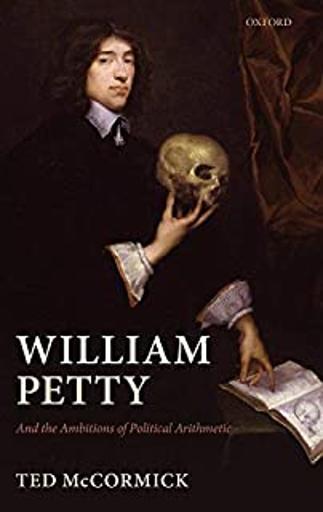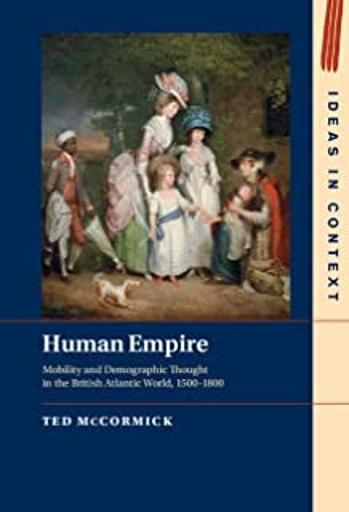
Ted McCormick, PhD, FRHS
- Professor, History
- Fellow, School of Irish Studies
Are you the profile owner?
Sign in to editResearch areas: Early modern British/Irish/Atlantic history, intellectual history, history of science, history of economic thought
Contact information
Email:
ORCID:
Biography
Education
BA (1999) University of Maryland, College Park
MA (2001) and PhD (2005) Columbia University
Biography and research interests
I am interested in early modern attempts to connect science, technology, empire, and economy. My research focuses especially on the seventeenth- and early eighteenth-century British world.
My first book, William Petty and the Origins of Political Arithmetic (Oxford University Press, 2009), used the manuscript archive of Sir William Petty (1623-1687) to show how a new discourse of quantitative, scientific governance, "political arithmetic," resulted from a combination of Baconian ideals, mechanical philosophy, and alchemical ideas being applied to the problem of transforming politically and culturally distinct populations in colonial Ireland and beyond as well as managing religious difference and labouring populations in Britain. My second book, Human Empire: Mobility and Demographic Thought in the British Atlantic World, 1500-1800 (Cambridge University Press, 2022), argues that a series of engagements over three centuries with the qualities of specific groups – husbandmen, vagrants, the Irish, and colonial and colonized populations across the Atlantic – created population as an object of transformation, and made the transformation of populations a central task of government and a key component of the public good. Both William Petty (in 2010) and Human Empire (in 2023) were awarded the John Ben Snow Prize, given annually by the North American Conference on British Studies for "the best book by a North American scholar in any field of British Studies dealing with the period from the Middle Ages through the eighteenth century."
With the support of a 2020-24 SSHRC Insight Grant, I have begun research on a third book, Engines of Division, looking at the role of technological projects and mechanical inventions in Ireland, the English Caribbean, and beyond, circa 1650-1720. Using manuscripts in UK, Irish, and Caribbean archives, I hope to elucidate how the perceived implications of technology changed between colonial contexts, and how these differences reflected and informed practical and ideological engagements with labour and constructions of humanity and race. I am also interested in the history of scientific and economic projects and projecting transnationally and globally, in the early modern period and beyond, something I have pursued in collaboration with other scholars. Vera Keller (University of Oregon) and I edited a 2016 special issue of Early Science and Medicine devoted to the history of projecting; together with Kelly Whitmer (Sewanee), we are currently editing another collection, "Knowledge and Power: Projecting the Modern World", for the Journal for the History of Knowledge, to appear in 2025.
I have published research articles in Osiris, History of Science, Irish Historical Studies, the Journal of British Studies, The William and Mary Quarterly and other journals, and contributed chapters to several edited volumes on the history of political and economic thought, early social science, and Ireland -- including The Oxford Handbook of Modern Irish History and The Cambridge History of Ireland. I've also written for broader audiences in History Compass, The Chronicle of Higher Education, The Conversation, and Slate, and my work has been featured in Pour la Science and the London Review of Books.
A Fellow of the Royal Historical Society (UK), I have been an Associate Editor of the Journal of British Studies and am currently on the Advisory Board for Eighteenth-Century Studies.
Student supervision and placement
Former Honours and MA students of mine have gone on to further study at McGill and Dalhousie in Canada as well as Columbia, the CUNY Graduate Center, NUI Galway, Oxford, and Trinity College Dublin. A list of current and past students, including thesis topics/titles with dates of completion, is below.
I am not currently accepting new supervisees.

William Petty and the Ambitions of Political Arithmetic (2009)

Human Empire: Mobility and Demographic Thought in the British Atlantic World, 1500-1800 (2022)
Grants, fellowships, and awards (selected)
Publications
Books
Human Empire: Mobility and Demographic Thought in the British Atlantic World, 1500-1800, Ideas in Context (Cambridge: Cambridge University Press, 2022) [book here; preview here]
William Petty and the Ambitions of Political Arithmetic (Oxford: Oxford University Press, 2009) [book here; reviewed in the London Review of Books here]
Journal special issues
Co-edited with Vera Keller, "Towards a History of Projects", special issue, Early Science and Medicine 21:5 (2016) [special issue here]
Articles and book sections
"Improvement, Projecting, and Self-Interest in the Hartlib Circle, c.1640-1660", in Christine Zabel (ed.), Historicizing Self-Interest in the Modern Atlantic World: A Plea for Ego? (London: Routledge, 2021), 25-43 [book here]
"Food, Population, and Empire in the Hartlib Circle, 1639-1660", in Emma Spary and Anya Zilberstein (eds.), Food Matters: Critical Histories of the Food Sciences, Osiris 35 (2020): 60-83 [article here]
"Projecting the Experiment: Science and the Restoration", in Janet E. Clare (ed.), From Republic to Restoration: Legacies and Departures (Manchester University Press, 2018), 185-205 [book here]
"Restoration Politics, 1661-1691", in Jane H. Ohlmeyer (ed.), The Cambridge History of Ireland, vol. 2: Early Modern Ireland 1550-1730, 96-119 (Cambridge University Press, 2018) [chapter here]
"Moral Geometry in Restoration Ireland: Samuel Foley's Computatio Universalis (1684) and the Science of Colonisation", Irish Historical Studies 40:158 (2016): 192-207 [article here; pre-publication version here]
"Who Were the Pre-Malthusians?", in Robert Mayhew (ed.), New Perspectives on Malthus: 250th Anniversary Essays (Cambridge: Cambridge University Press, 2016) [book here; pre-publication version here]
"Alchemy into Economy: Material Transmutation and the Conceptualization of Utility in Gabriel Plattes (c.1600-1644) and William Petty (1623-1687)", in Guillaume Garner and Sandra Richter (eds.), „Eigennutz“ und „gute Ordnung“: Ökonomisierungen im 17. Jahrhundert (Wiesbaden: Harrassowitz Verlag, 2016), 339-52 [book here; pre-publication version here]
"Statistics in the Hands of an Angry God? John Graunt's Observations in Cotton Mather's New England", William and Mary Quarterly 72:4 (2015): 563-86 [article here; pre-publication version here]
"Restoration Ireland, 1660-1688”, in Alvin Jackson (ed.), The Oxford Handbook of Modern Irish History (Oxford: Oxford University Press, 2014) [book here]
“Political Arithmetic’s Eighteenth-Century Histories: Quantification in Politics, Religion, and the Public Sphere”, History Compass 12:3 (2014): 239-51 [article here]
“Population: Modes of Seventeenth-Century Demographic Thought”, in Carl Wennerlind and Philip J. Stern (eds.), Mercantilism Reimagined: Political Economy in Early Modern Britain and Its Empire (New York: Oxford University Press, 2013), 25-45 [book here]
“Political Arithmetic and Sacred History: Population Thought in the English Enlightenment, 1660-1750”, Journal of British Studies 52:4 (2013): 829-57 [article here]
“Governing Model Populations: Queries, Quantification, and William Petty's ‘Scale of Salubrity’”, History of Science 51:2 (2013): 179-98 [article here; pre-publication version here]
“‘A Proportionable Mixture’: Sir William Petty, Political Arithmetic, and the Transmutation of the Irish,” in Restoration Ireland: Always Settling and Never Settled, edited by Coleman Dennehy (Aldershot: Ashgate, 2008), 123-39 [book here]
“Transmutation, Inclusion, and Exclusion: Political Arithmetic from Charles II to William III,” Journal of Historical Sociology, 20:3 (2007): 259-78 [article here]
“Alchemy in the Political Arithmetic of Sir William Petty (1623-1687),” Studies in History and Philosophy of Science, 37:2 (2006): 290-307 [article here]
Magazine articles
"Steven Pinker, Rational Thinker", Slate.com, 30 September 2021
"The billionaire space race reflects a colonial mindset that fails to imagine a different world", The Conversation, 15 August 2021
Co-authored with Shannon Dea, "Can 'progress studies' contribute to knowledge? History suggests caution", The Conversation, 11 August 2019 (article here)
"Publish and Perish", The Chronicle Review, Chronicle of Higher Education 63:19, 13 January 2017 (article here)
Papers and presentations
Conference, workshop, and seminar presentations (last two years)
(With Vera Keller, University of Oregon), "The Sciences of Projects: Entangled Forms of Knowledge in the Long Seventeenth Century", Scientiae: Disciplines of Knowing in the Early Modern World (Tenth Annual Meeting), Czech Association of Scientific and Technical Societies, Prague, 8 June 2023
"Waste, Wealth, and White Paper: Historicizing Plantation in the Seventeenth Century", Montreal British History Seminar, McGill University, 23 February 2023
"Perpetual Motion and Labour in the British Atlantic World: Cressy Dymock's 'Marriage of Strength and Time (1648-78)", History of Science Society Annual Meeting, Chicago, 18 November 2022
"Irish Plantation as a Knowledge-Making Project: The Down Survey (1654-8) Revisited", "Plantation Knowledge" workshop, Global South Studies Center, University of Cologne, 16 June 2022
"Land, Labour and Colonial Projecting: The Down Survey (1654-8) Reconsidered", "Ireland and the Wider World" conference, Huntington Library, San Marino, 9 April 2022
"Revisiting the 'Projecting Age'", Presidential session roundtable: "New Horizons in Enlightenment Studies", American Society for Eighteenth-Century Studies annual meeting, Baltimore, 31 March 2022
Teaching and supervision
Courses 2023-2025
Fall-Winter 2023-24
LBCL 391: Political and Philosophical Foundations II (Great books, c.1650-1920)
Winter 2024
HIST 207: Early Modern Europe
Fall 2024
Sabbatical
Winter 2025
HIST 328: The Scientific Revolution
Courses taught
Lectures
HIST/HISW 207: Early Modern Europe
HIST 326: Reformation and Counter-Reformation
HIST 328: The Scientific Revolution
HIST 340: Early Modern Britain and Ireland
HIST 382: The Enlightenment
HIST 398: Intolerance and Toleration in Early Modern Europe
HIST 402: The Philosophy and Practice of History (Honours)
HIST 403: Methodology and History (Honours)
IRST/HIST398: Ireland in the Atlantic World (Irish Studies)
Subject seminars (offered as HIST 437/610)
Early Modern Utopias
History and Progress in the Enlightenment
Knowledge and Power in Early Modern Europe
Revolutions in Three Kingdoms: England, Scotland, and Ireland 1640-1660
Science and Early Modern Culture
Graduate and Honours students (current and graduated)
MA
Pavel Zagumenny (Western travellers, religion, and Enlightenment in later eighteenth-century Russia) (current)
Riel Schryer (Race and the history of the earth in the eighteenth century) (current)
Molly Taylor (Courtiers and polemic in later Stuart England) (current)
Devyn Gwynne (Kenelm Digby [1603-1665] and seventeenth-century natural philosophy) (current)
Solveig Hanson, "Midwives, Knowledges, and Medical Publications in Seventeenth-Century England and Ireland" (current)
Hannah Sparwasser Soroka, "Anthropophagy in Three Keys: New World Cannibalism, the Blood Libel, and Corpse Medicine in the British Atlantic World, 1640-1660" (2021)
Rana Fahmy, MA thesis, "Re-Settling Woes and Rebellions: The Role of Irelands Natvrall History in the Cromwellian Era" (2019)
James Leduc, MA thesis, "Between Sovereignty and Conscience in the Early Modern World: Archbishop Richard Creagh and the Problem of Government in Tudor Ireland" (2017; winner of the Edward Eastman McCullough Award for best MA thesis in History)
Tyson Lowrie, MA essay, "Broadcasting Peace: UN Peacekeeping Radio Operations, 1989-Present" (2015)
Vanessa Hulewicz, MA essay, "Breeding Behaviour: Etiquette and Companionate Marriage among the British Elite, 1870-1920" (2015)
Thomas Reubens, MA essay, "Barebones of the Financial Revolution" (2013)
Honours
Molly Taylor, "Criminal and Wicked Consciences: Anti-Catholicism and Anti-Popery in Restoration London" (2021)
Cynthia Panneton, "The Struggle of Friends: Toleration and Persecution of Quakers in Seventeenth-Century England and New England" (2016)
Patrick Reed, "'Seized by Terror and Great Fear': Emotions as Ideology in Early Medieval Ireland" (2016)
Christopher Schütze, "Sir William Osler's View: Medical Science, Institutionalization and Community in the Nineteenth Century" (2009)
Pierre-Etienne Stockland, "'Nature Doth Everywhere Geometrize': The Ontology of the Beehive in Seventeenth-Century English Natural Philosophy" (2009; winner of the David Fox Memorial Prize for best History Honours thesis)


